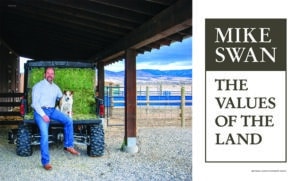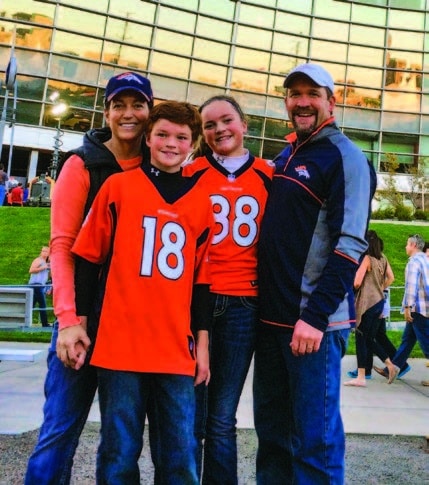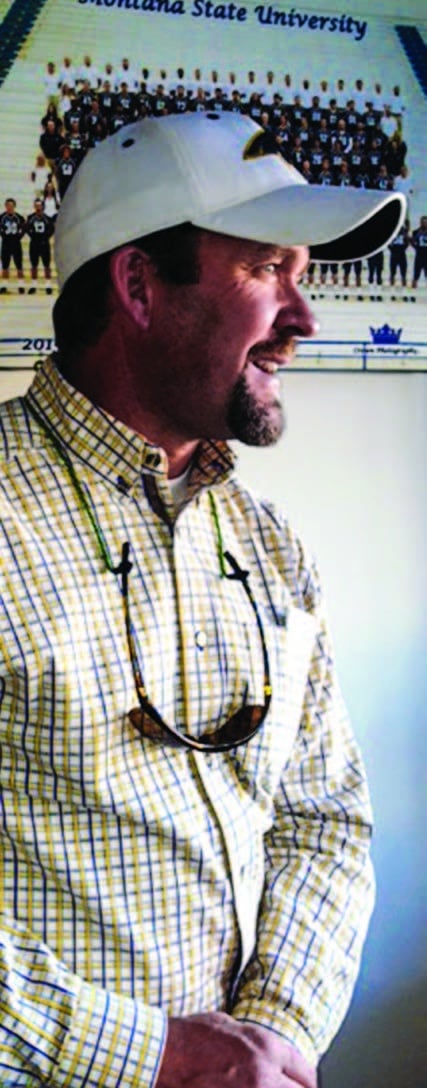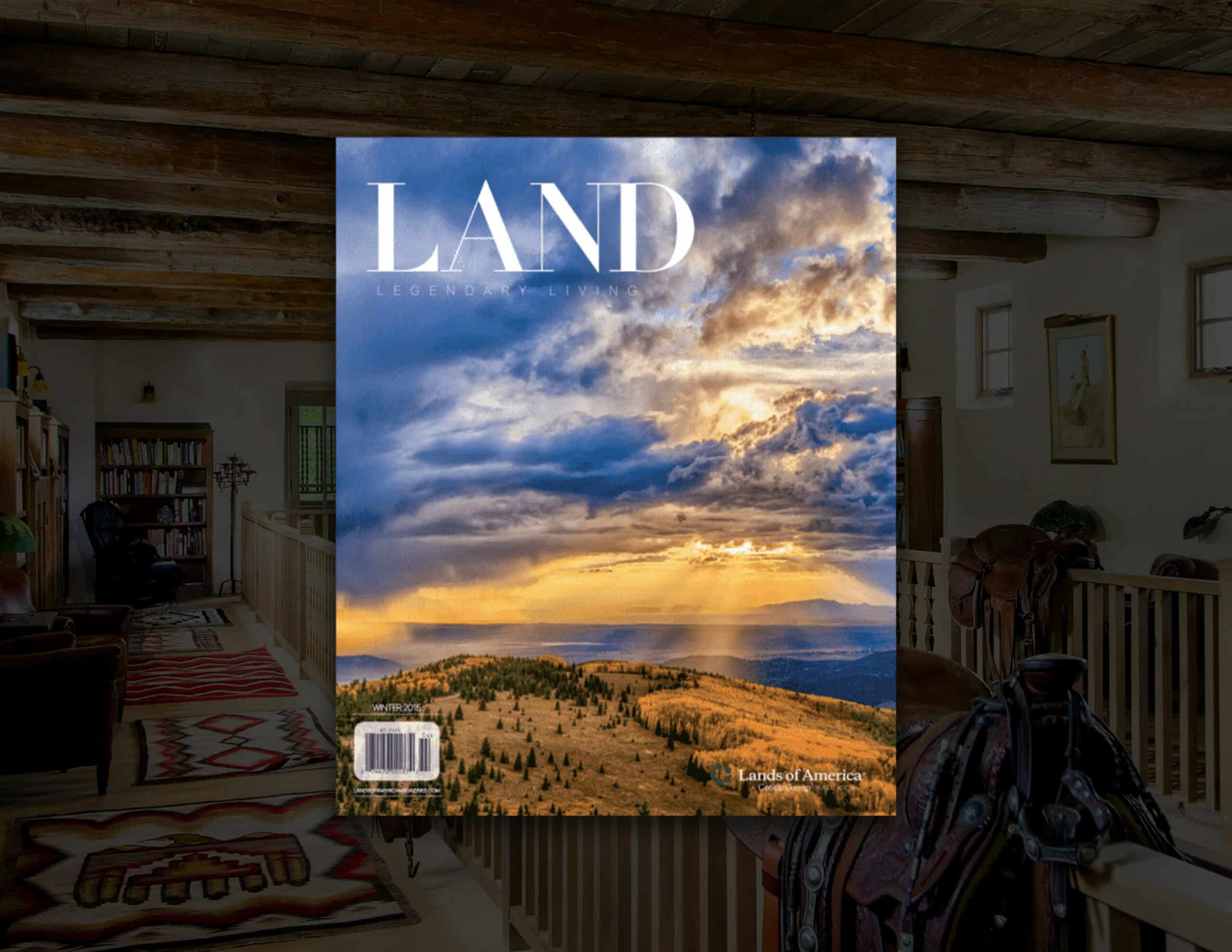When Mike Swan’s father, George, taught him the values of responsibility, hard work and protecting the family name as they worked side-by-side on the family’s commercial cow-calf ranch in Montana’s Ruby Valley, it wasn’t in anticipation of a phone call from the actress Jane Fonda.
“My phone rang one day and it was Jane Fonda,” said Swan, owner and managing broker of Swan Land Company in Bozeman, Mont. “She said, ‘I’ve heard your name in several of my circles and I think you’re someone I need to meet.’ All I could think was ‘How in the world would Jane Fonda know my name?’”
Mike Swan on The Values of the Land
Article By Lorie Woodward Cantu | WINTER 2015 ISSUE OF LAND
In hindsight, it’s really no mystery. The world of high-end real estate investors is as small as Twin Bridges, Montana, where Swan was raised. In little towns and small circles, news travels fast and reputations matter. Swan sold Fonda’s New Mexico ranch in October 2015.

“It all comes back to who you are and what you stand for,” Swan said. “No matter how much success you enjoy, you have to remember where you came from, the lessons of your upbringing—and to do the right thing every day for every client in every situation.”
“Whether you’re sitting down with business executives in a corporate board room or ranch families at the kitchen table, if you’re not a person of your word, they will see right through you,” he said. “As a team, we serve a very selective, exclusive niche. We do what we say we’re going to do—and work day and night to perform for our clients.”
Swan’s personal work ethic again reflects the lessons of the land. As youngsters, Swan and his brothers were expected to be working on the family’s ranch when they weren’t at school or at sports practice.
“My dad believed in hard work and instilled a strong, strong work ethic in us—nothing is given, but everything can be earned,” he said. “Giving up was not an option—we learned to persist through some very challenging circumstances. You find out what you are made of at a young age.
“He handed us tremendous levels of responsibility at very early ages. It shaped all three of us into the men we are today.”
Production agriculture is a tight-margin business. When a family has three strapping boys like the Swans did, it doesn’t make sense to hire help. So the youngsters took on the real-world responsibilities of tending livestock, growing crops and running machinery at the time other kids were learning to make their beds and mow the grass. Their efforts directly contributed to the bottom line of the family business. It was not made-up work.
“There were times when I was a teenager that I didn’t appreciate the way I was raised, but now I wouldn’t change one minute of it—one lesson from it—for the world, ” Swan said. “We were taught that we were responsible to the land and our livestock.”
Swan and his wife, Nancy, have chosen to rear their children on a small ranch on the outskirts of Bozeman, just a mile from his parents. Life revolves around school, sports, church and 4-H. As a family, they raise, show and sell club lambs in order to teach their ninth-grade daughter and sixth-grade son how to be responsible and work hard.
THE ROUTE TO REAL ESTATE
When your roots are sunk deep in the rich Montana soil and you’re anchored in the West’s rich ranching tradition, it’s not easy to consider the possibilities of life beyond the gate. As a recipient of a grand legacy, the emotional benefits of the lifestyle can cloud the financial realities.
“I loved the livestock side of the ranching business,” Swan said. “As a teenager, it was hard to imagine doing anything else—except sports.”
Once again, his dad and his mother, Betty, who worked as a nurse in the local community, were clear-eyed and wise.
“My parents insisted that we all go try something else,” Swan said. “They told us to spread our wings for a while before deciding whether or not we would ranch. They promised, if after we’d flown solo, if we wanted to come back to the ranch they’d do everything in their power to help us get established.”
The elder Swans were both collegiate athletes. Their sons followed in their footsteps. Rory played football for Carroll College in Helena, Montana, while Steve and Mike were track and field athletes at Montana State University in Bozeman.
“Agriculture and athletics were what I knew and enjoyed,” he said.
As a freshman at Montana State, Swan found a passion for both coaching and athletic management. He focused on becoming a collegiate athletic director. Doug Fullerton, who was then athletic director at Montana State and is now the Commissioner of the Big Sky Conference, took Swan under his wing.
“I worked two part-time jobs while I was a sprinter for the track team and an intern in the athletic department,” Swan said. “In all of that chaos, Doug not only showed me the ropes of athletic management, but really taught me how to use them without getting myself tangled up.”
When a knee injury ended his athletic career, the university kept Swan on as a sprint/hurdle coach. Upon graduation from Montana State, he enrolled at Idaho State University in Pocatello where, while interning in the athletic department, he earned a Maste r of Administration in 18 months instead of the expected two years.
r of Administration in 18 months instead of the expected two years.
In 1992, three weeks from completing his Master’s program, a friend pointed him toward an assistant sports marketing director job in the athletic department at the U.S. Air Force Academy. Swan flew from Pocatello to Colorado Springs for an interview on a Wednesday, was offered the job that Friday, and flew back to Pocatello on Saturday where his dad met him with a horse trailer. Together, they loaded up all his worldly possessions and drove back to Colorado Springs so the younger Swan could begin work at 8:00 a.m. Monday.
“I called my professors at Idaho State to tell them that I wouldn’t be coming back to school because I had a job,” he said. “They helped me wrap up school with phone calls and the U.S. mail —I was walking on air I was so excited.”
Three months into his new job, Swan got a phone call from the athletic director who was a full bird Air Force colonel. Swan, who was “invited” to meet him at 8:00 a.m. the following morning, was understandably nervous. He didn’t need to be. The colonel, noting Swan had “made a big impression in a short time,” promoted him to assistant athletic director giving him responsibility for sports camps, event management, eight staff members and 27 traveling teams. Swan was 25 years old.
At the Air Force Academy and in subsequent athletic director positions in Montana and California, Swan developed a management philosophy that would later shape his real estate business.
“When your job is to compete every day, you have to prepare better than everybody else; anticipate the intangibles; constantly reevaluate your strategies; and make sure that everyone places the team ahead of themselves,” he said. “To win in athletics and business, it’s not about developing independent superstars, but team players with specific skill sets who fulfill their roles with professionalism, dedication and pride.”
By 2001, the high-pressure job was taking its toll. As athletic director at Humboldt State University in northern California, Swan was leaving the house at 5:30 a.m. and getting home long after dark. It left him little time with Nancy, who he identifies as the best thing to happen to him while in Colorado Springs, and their newborn daughter.
“We were praying about making a change and getting back to Montana, but I didn’t know what I would do professionally,” he said. “I wasn’t too keen on selling feed or ag pharmaceuticals.”
When they traveled to Montana on vacation in June of 2001, he told his father what he was thinking. His dad promised to make a few phone calls. One of them was to Patrick Bates, broker-owner of Bates Land Consortium, in Salt Lake City, Utah. Bates had handled the sale of the family’s ranch when the elder Swans retired.
Bates and Swan connected on all levels.
A NEW CHALLENGE
On September 11, 2001, the world changed. Bates called to say the timing was wrong for a new office. Swan responded he was going home regardless—and would find a way to make a living. They agreed to proceed with their plans.
In February, 2002, Swan obtained his real estate license, rented an office in Bozeman, and spent one long week waiting for the phone to ring.
“I asked Nancy, ‘What did we just do!?’” Swan recalled.
According to him, she replied, “I’ve got faith in you. God will provide because you work hard—and you’re going to make good things happen.”
He continued, “Her faith in me and our faith in God has made all the difference.”
After the first week of waiting, Swan decided to make things happen by reconnecting with landowners and business professionals who were family acquaintances throughout Montana.
“Once again, my parents’ devotio n to keeping our good family reputation paid off for me. I was welcomed at kitchen tables, auction barns, cafes—wherever I went,” Swan said.
n to keeping our good family reputation paid off for me. I was welcomed at kitchen tables, auction barns, cafes—wherever I went,” Swan said.
Because he was engaged in the landowner community, he caught wind that the owners of the historic Cal Creek Ranch, a 28,000-acre property in the Ruby Valley, were considering changing ranch brokers. He secured an interview with the owners who were based in Chicago and California.
The owners were taken by the combination of Bates’ experience and Swan’s go-getter enthusiasm. The duo got the multi-million dollar listing. In 18 months, they sold the property.
“Pat taught me a tremendous amount about the real estate business,” he said. “But I still had to prove myself. After I handled the first couple of deals, people knew that I could deliver.
“Over time, and after handling numerous transactions, your reputation develops,” Swan said. “Satisfied clients lead to more clients—and it’s all grown from there.”
His upbringing, combined with his market acumen, landed Swan the opportunity to represent the 124,000-acre Broken O Ranch in 2012.
A large pool of potential ranch real estate brokerages from across the Rocky Mountain West had been whittled down to three. Swan found himself in a 14th story board room of a San Francisco high-rise pitching to attorneys, accountants and trustees in well-tailored suits.
Two weeks later as Swan and his family were en route to Colorado Springs, his phone rang. It was the attorney representing the Broken O’s Trustees. In the parking lot of the Flying J Truck Stop in Casper, Wyoming, Swan received the news he would be at the helm of a deal that was to be listed for $132.5 million. As fate would have it, the attorney was a Casper native.
He said, “You’re our guy. Your closing comment about your work ethic and focus made the difference because we knew where you came from—and knew that you meant it.”
In November of 2012 Swan sold the Broken O Ranch to Stan Kroenke. That winter he opened Swan Land Company.
It’s no surprise the foundation of the hard-charging exclusive firm is personal integrity and hard work. Swan and his team have developed a reputation for handling high-profile, and often times, complex transactions: most notably the Broken O Ranch, Lazy J Ranch and recently Fonda’s Forked Lightning Ranch, among others.
“I surround myself with good people—people of high personal integrity,” Swan said. “I can work with about anybody to help them learn real estate, but you can’t teach integrity and work ethic. When I find those rare individuals who have high character and drive—those are the people I want to associate with.”
In the past three years, Swan has expanded from a one-man operation based in Bozeman, Montana to offices in Salt Lake City, Utah, and Buffalo, Wyoming. Licensed in Montana, Wyoming, Idaho, Utah, Nebraska and New Mexico—Swan has expanded his firm’s reach across the entire Rocky Mountain West. His roster of trusted professionals has grown to include: Tim Anderson, Sam Sanders, David Lowry, Stephen Leibinger, Scott Williams, Leo Lane and Annie Leibinger.
“I am extremely proud of our team. We work very hard but have a lot of fun along the way,” Swan said. “We continually communicate and collaborate on how we can better serve our clients—strategizing is one aspect of our profession that I really enjoy.”
For Swan, though, the business is really all about the people, especially the people of the land.
“The best thing about the Rocky Mountain West is the people,” he said. “I love the people—their quality is second to none. In these long-line ranching and farming families, generations have worked to build a legacy.
“When I get invited to sit down at their kitchen tables to discuss representing them, all of that financial, historical and emotional responsibility rests on me. It’s an honor and a privilege that I take seriously—often times I’ve developed close personal friendships during the process—friendships that I will carry with me for a long, long time.

